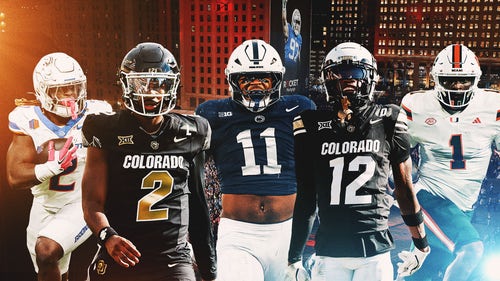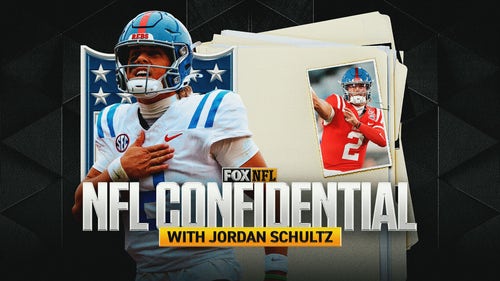
Campbell's road to NFL is uphill fight
No one should feel that life has been particularly unfair to Caleb Campbell, who twice has had NFL aspirations pulled from under him.
Although it's kind of like Lucy predictably moving the football as Charlie Brown takes a running start and approaches the kick, the Detroit Lions' linebacker certainly does not feel sorry for himself.
"Truthfully, it's been kind of like a blessing, you could say," Campbell told The Sports Xchange last week in addressing the lockout, the latest detour on a hardscrabble, off again, on again, in limbo path to an NFL career. "In its own way, the situation has probably . . . helped me to grow."
Indeed, were adversity actually measured in horizontal inches, Campbell might be able to petition Guinness officials about supplanting Sultan Kosen of Turkey as the world's tallest man. There seems little doubt after speaking with Campbell — a guy with whom anyone fretting about this country's future or depressed about their own circumstances in life should converse — is sincere about the ramifications of the work stoppage, at least from a personal enhancement standpoint.
Before any of the NFL's spin doctors or $500-an-hour attorneys seize on Campbell's assessment of the lockout as a propaganda tool or even fodder for legal briefs, know that the former Army standout defender hurts as much as any player in the league. Maybe more.
The last thing Campbell needs is a vacation from football, given that he has endured more than enough of that ordeal and he is laboring in Perryton, Texas, not sunning himself in the Caribbean or working on his sand-wedge artistry, or trying to arrange for a line of credit to pay his bills.
But the one-time West Point star and second lieutenant is more defined, he allowed, by what he does with his life outside of football. The lockout has been a lesson hard-learned, Campbell conceded, but a lesson nonetheless.
At the same time, Campbell should be a lesson to a lot of others. Even a person who is anything but a jingoistic flag-waver couldn't help but be impressed by the estimable former Army star, a button-down, yes sir-no sir kind of guy. Campbell's professionalism, perseverance and resilience are a refreshing divergence from the several players who have taken recently to the air or to social media to tweak the owners, the commissioner, even the executive director of their association, and the lockout in general.
"It's so temporary," said Campbell, who defies the old adage about "if it sounds too good to be true," in speaking of the game. "I had a life before football, and I'll have one after it. It's important to me; I want to be able to play. But it isn't like it's the only thing I think about every day. I've been forced to do without it before, right, and I made it through. I mean, that's just where I'm coming from."
Fittingly, to comprehend where Campbell might be headed with both football and his life, one has to understand from whence he came.
He was selected in the seventh round of the 2008 draft by the Lions, the 218th choice overall, the first Army player chosen since Ronnie McAda in 1997 and one of only 15 prospects tabbed from the three major service academies since 1970. Campbell participated in minicamps with the Lions that spring and had reported to the club's training camp that summer, poised to sign a three-year contract. That's when he was belatedly informed that the Army policy toward players who received a West Point education and were pursuing a career in professional athletics (known as the ASO) had changed.
Instead of withering two-a-days under then-Lions coach Rod Marinelli, ironically a former U.S. Marine and Vietnam War veteran, Campbell owed the Army two years of active duty.
His pursuit of a professional football career delayed, Campbell spent the two years at West Point, and learning about air defense artillery, essentially studying missiles, at Fort Sill in Oklahoma. Unlike some of his West Point buddies, he was not deployed to Iraq or Afghanistan, but was still in a bunker of sorts and not a defensive huddle.
Now that his two years are complete, Campbell doesn't owe the Army any more time, but he does owe the government a considerable chunk of money, and a debt of gratitude as well.
"It shaped me," said Campbell. "It made me who I am."
The process of finding out whether Campbell is an NFL linebacker, a position to which he switched after starring at Army as a strong safety, has been put on hold by the lockout. It is one of the crueler elements of the labor strife.
Players with higher profiles garner much of the attention, but relatively speaking, the effect on Campbell might be of greater impact. There are victims in the lockout, it shouldn't be forgotten, beyond the squeaky-wheel types.
Signed by the Lions last year as a free agent, Campbell was twice elevated from the club's practice squad in 2010 and was on the roster for four games. He appeared in three of them and posted three tackles. He dressed out for his first regular-season game Nov. 21, at Dallas, nearly 31 months after he had originally been drafted.
With the team's unsettled situation at the linebacker spot, and his familiarity with the scheme of Detroit defensive coordinator Gunther Cunningham, there is actually a chance the 24-year-old Campbell, a high school quarterback, could earn some playing time, beyond special teams action, in 2011.
But, of course, there is the matter of the lockout.
FOXSports.com published a terrific story last week about former Air Force wide receiver Spencer Armstrong, who was not drafted last month, and who had hoped to sign with a team for training camp as a free agent. But Campbell's tale, anything but cookie-cutter, may be just as compelling. Perhaps even more so, because he actually had a short taste of the NFL life, and for now, at least, that tasty carrot on which he had munched, albeit briefly, has been snatched from him.
Campbell continues to work out every day in his hometown of Perrytown, a small town of about 8,000 population and fewer than five square miles, in the North Texas panhandle. Known as the "Wheatheart of the Nation," Perryton lies among gas and oil fields and is perhaps best known for the fictional character Hank the Cowdog, who is part of the works of author John R. Erickson, and for former major league baseball player and manager Mike Hargrove.
And, hopefully, for Caleb Campbell as well.
It could be easy for Campbell to abandon his dream and probably find employment in the corporate world or some private sector field. Some of his friends, former players at Army whom he considered potential NFL prospects, have recently left the game, in part because they feel a two-year hiatus will be too difficult to overcome.
Said Campbell: "I say, like, 'What are you doing?' I'm not giving up."
Toward that end, Campbell works out daily at a local gym, forcing himself to stay in shape, toning his 6-feet-2 and 229-pound frame, waiting for the lockout to end. He is still chasing the carrot dangling tantalizingly in front of his nose.
Campbell was the final draft choice exercised in Detroit under the mostly forgettable stewardship of then-general manager Matt Millen. Although some Lions fans might justifiably prefer to expunge that miserable era from their memory banks, the young linebacker is determined not to allow people to dismiss him so easily.
"The routine is a challenge," Campbell said. "You've got to be physically and mentally and emotionally into it. Some days, you really have to push yourself, you know? But I've never been one to just settle. Life is all about overcoming obstacles, and this is just one more for me.
"People say, 'Well, you were really dealt a bad hand.' But I'm such a better man now because of all this stuff. I'd just be foolish to feel sorry for myself."










